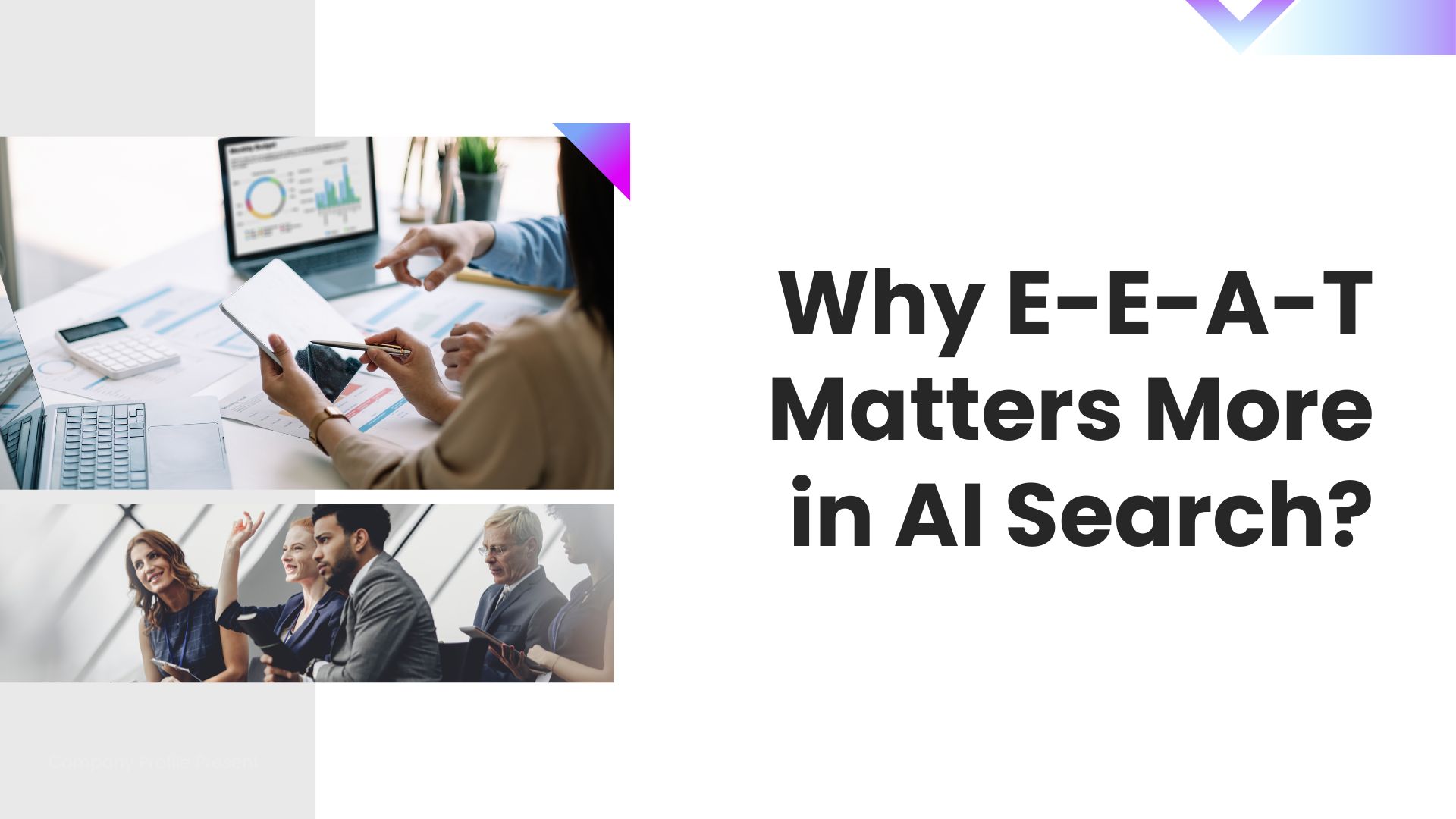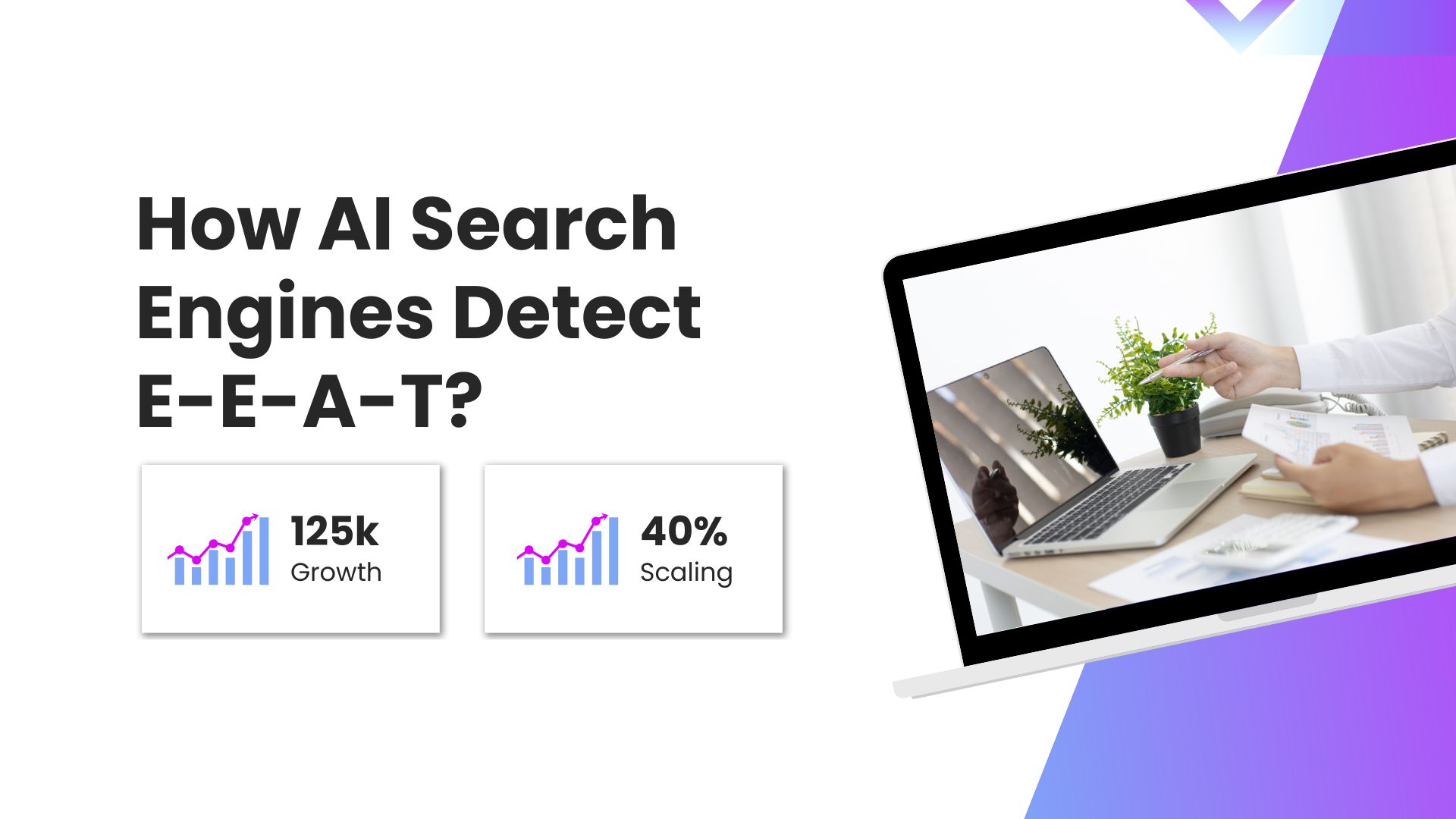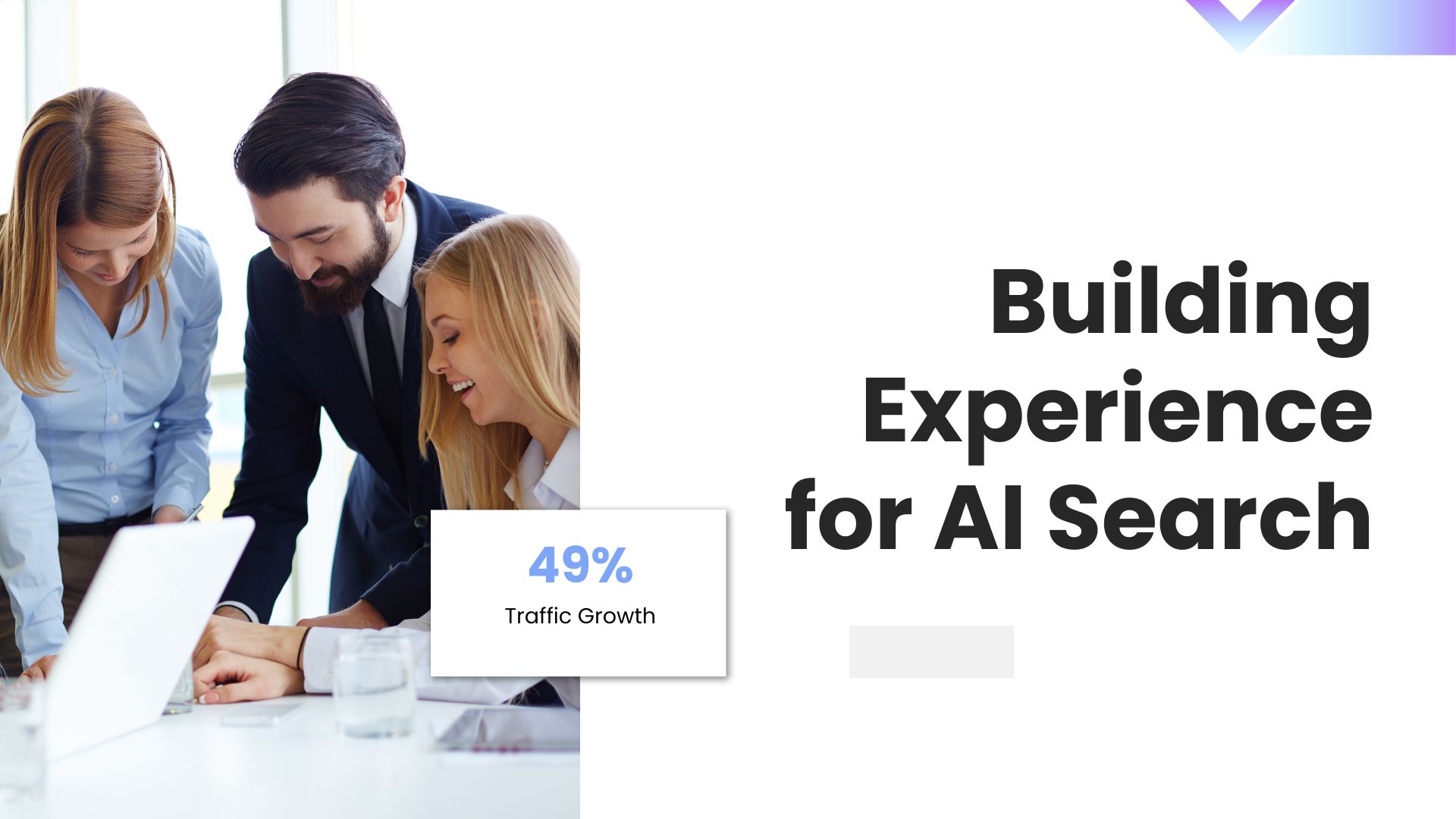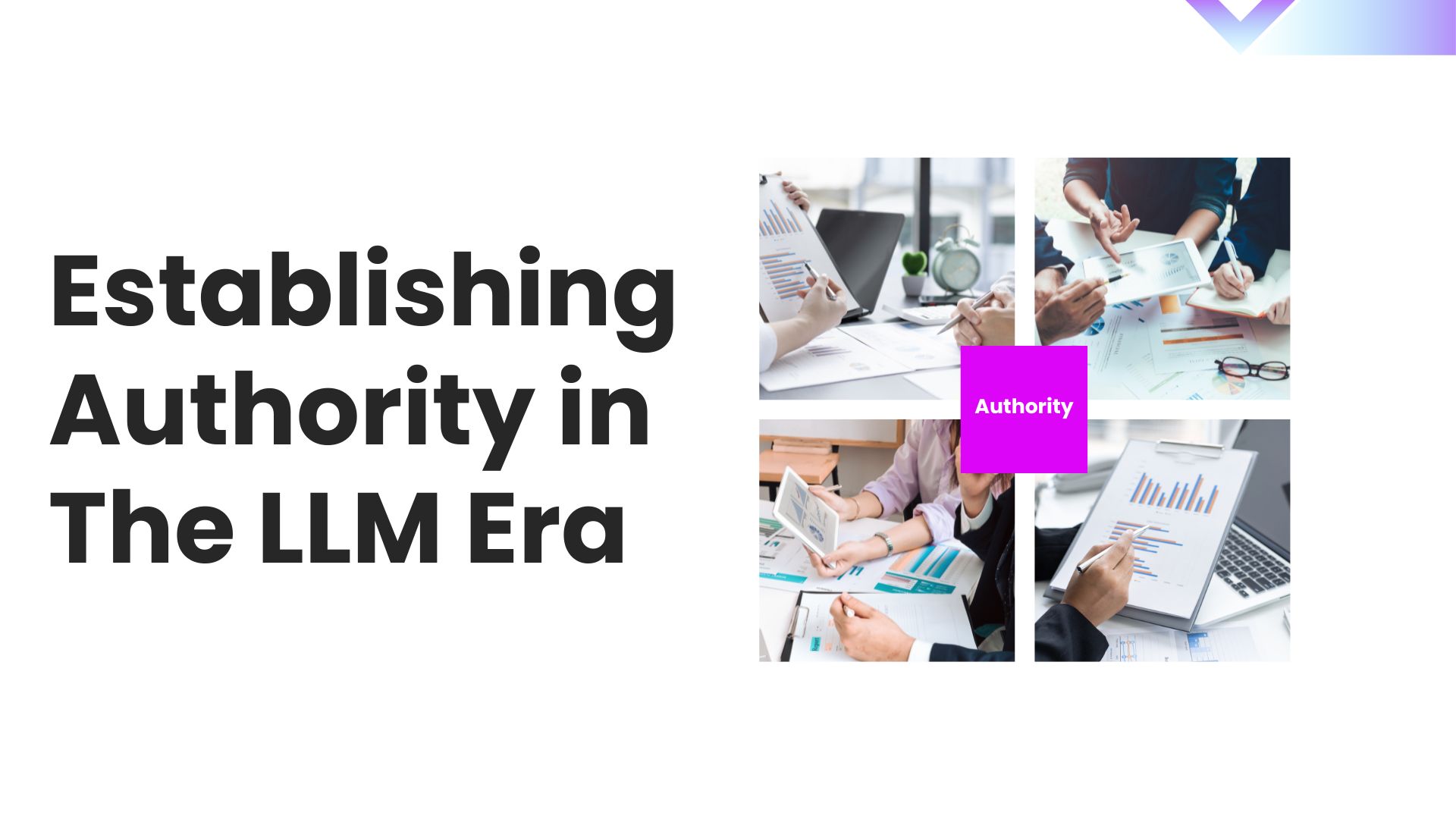The contribution of E-E-A-T has become more integral and prominent in this LLM era as artificial intelligence is evolving and shaping several aspects of our lives. Moreover, it is crucial to consider that we can interact with data available on the internet with various AI-driven search functions and other essential facilities.
Nonetheless, Google is also upgrading its E-E-A-T (Experience, Expertise, Authoritativeness, and Trustworthiness) feature with its core update. Furthermore, with each update, it introduces us to new rules and features, particularly for content optimization and the impact of AI on search rankings. Nonetheless, it has an extraordinary effect on various professions, like creators and publishers alike.
In this article, we will discuss E-E-A-T in AI search, its impact on AI-generated content, and several other considerations for various stakeholders.
Contents
- 1 Why E-E-A-T Matters More in AI Search?
- 2 Understanding E-E-A-T in The Context of LLMs
- 3 How AI Search Engines Detect E-E-A-T?
- 4 Building Experience for AI Search
- 5 Strengthening Expertise Signals
- 6 Establishing Authority in The LLM Era
- 7 Building Trust for AI Citations
- 8 Tools And Metrics for Measuring E-E-A-T in AI Search
- 9 Common Mistakes That Hurt E-E-A-T in AI Search
- 10 In Conclusion
Why E-E-A-T Matters More in AI Search?
As AI technology evolves daily, shaping our interaction and web information processing, the contribution of E-E-A-T has become crucial for ensuring content quality. Moreover, this procedure has become an essential factor for both content visibility and credibility. Mainly, how the LLMs (Large Language Models) rank, summarize, and curate data.
Nonetheless, there are various reasons why E-E-A-T has become important in AI searches, such as:
AI As The New Door to Information
AI searches nowadays deliver summarised answers to search queries, which sometimes do not contain any citations or context. Moreover, this changes the process of analysing credibility from each user to the model.
Nonetheless, content that efficiently follows the proper guideline of E-E-A-T has a better chance for visibility in AI searches.
Trained LLMs on Credibility Signals
Trained LLMs operate on extensive corpora and implement various implicit administrative signals such as citations, backlinks, clarity, and many more. Moreover, webpages that indicate Experience and Expertise have a good chance of being referenced in AI searches.
Critical Reliability in the Hallucination Era
The Large Language Models (LLMs) sometimes alter facts or information, which can decrease the user’s reliability. Nowadays, the AI facilities and search engines mainly favor sources that are up-to-date, transparent, and accurate.
Answer-First Searches
When you search for something on the search engines, you automatically get AI-generated answers without clicking on a link to a particular webpage. This procedure suggests that there will be fewer clicks and visits to your webpages, while also increasing the competition for inclusion in AI-generated answers.
Understanding E-E-A-T in The Context of LLMs
There are multiple Large Language Models you can refer to, such as GPT-4, Claude, Gemini, Microsoft Copilot, and many more. Moreover, these LLMs are currently reshaping how you can retrieve, synthesize, and deliver data. Furthermore, this process takes the E-E-A-T (Experience, Expertise, Authoritativeness, and Trustworthiness) function to a different approach.
The E-E-A-T function is a part of the Google ecosystem that ensures the human quality of the search content. Nonetheless, the E-E-A-T function can also alert users to how various AI models can create, evaluate, and amplify your content.
Nonetheless, there are also several ways in which Large Language Models can interpret E-E-A-T; they mainly use various facilities alongside the AI searches, such as:
- Metadata like author bios, update dates, schema markup, etc.
- Content networks like references to a domain.
- Contextual frequency for specific sources.
- Various semantic cues, such as neat structure, citation style, accurate language, and many more.
How AI Search Engines Detect E-E-A-T?
There are various search engines, such as Google SGE, Bing Copilot, and Perplexity, alongside other AI tools by Large Language Models (LLMs), like GPT-4, Gemini, and Claude, that do not calculate the E-E-A-T like a human evaluation.
Moreover, these tools and search engines infer the E-E-A-T (Experience, Expertise, Authoritativeness, and Trustworthiness) approach by a combination of various factors. For example, you can refer to structured metadata, training data designs, machine-learned signals, and many more.
Nonetheless, this is how AI Search Engines Detect Experience, E-E-A-T:
Experience: How AI Finds First-Hand Insights
The AI functions mainly search for various language patterns and structural markers of existing Experience, such as:
- First-person pronouns.
- The narrative structure.
- Elaborations of environments, emotional responses, and tools.
Expertise: How AI Recognizes In-Depth Knowledge
The AI facilities can detect Expertise through various methods and factors, for instance, you can refer to:
- Implementation of conceptual clarity and domain-oriented terminology.
- Links or citations to famous technical and academic sources.
- Structured tutorials and explanations.
- Author information in metadata, such as person, author, etc.
Authority: How AI Identifies Reliable Sources
The AI system mainly infers Authority through these factors, such as:
- Various domain-level signals, like long-standing domains that consist of ‘edu’, ‘gov’, etc.
- Several inlink patterns occur when different authoritative domains mention or cite your content.
- Brand mentions across the internet or the web, such as co-occurrence and entity linking.
- The facility of training set exposure means that if your brand or website frequently appears in reliable contexts, it has a higher chance of being preferred by the LLMs.
Trust: How AI Inspects Content Reliability
AI models and systems mainly assess Trust through various factors, for instance, you can refer to:
- Factual alignment and precision with known data, such as scientific consensus, Wikipedia, and many more.
- Updated content that includes stat freshness and last-modified dates.
- Editorial transparency and clear authorship.
- Secure websites with HTTPS protocols and a clear UX with no harmful links or intrusive advertisements.
Building Experience for AI Search
One of the latest and most prominent aspects of Experience, Expertise, Authoritativeness, and Trustworthiness (E-E-A-T) is the Experience in the critical era of AI searches. The approach of Experience differs significantly from Expertise, which is mainly theoretical and formal.
Nonetheless, you can mainly refer to Experience as a first-hand insight and a personal engagement with a subject. Furthermore, considering the context of AI search, we find various mentions of generative AI, including ChatGPT, Perplexity, and Google SGE.
Moreover, these generative AIs primarily build Experience, which indicates creating content that precisely captures the complete contextual clarity. Nonetheless, here are some factors regarding building experience for AI searches:
The Significance of Experience in AI Searches
The AI systems mainly operate by spotting patterns of precision and authentic knowledge or data. Moreover, you can also refer to content that primarily reflects the existing Experience, such as:
- Content that has a higher chance of being cited in AI summaries.
- Content that can be perceived as more reliable in sensitive topics such as product usage, health, careers, and other personal or professional areas.
- Content that sometimes ranks better in generative search experiences that mainly favor personal administration.
How to Create And Indicate Experience in Content
There are various ways you can build and gain Experience in content, such as:
- Implementing the person’s languages in content and becoming explicit about your Experience.
- Describing how you did something, what happened, and what you learned from the experiment in your content.
- Implementing visual evidence such as screenshots, graphs, dashboards, step-by-step photos, embedded videos, and many more.
- Creating review content and comparisons that include side-by-side testing, reviews, and benchmarks.
- Contributing to niche communities, including content publications and references in various online platforms such as Reddit threads, StackOverflow answers, Medium posts, GitHub issues, and many more.
- Document case studies and different use cases that mainly contain various factors like outcome, used tools, the solution process, and the problem.
Strengthening Expertise Signals
You need to strengthen the expertise signals as it is crucial for standing out in AI-driven searches. Moreover, this is where the LLMs (Large Language Models) determine which content to trust, summarize, and surface in searches.
This procedure differs significantly from conventional Search Engine Optimization, where we can observe backlink domination and keyword placement. Nonetheless, various factors AI searches mainly reward, such as verified subject matter insights, depth, clarity, and many more, which are all authentic signals of Expertise. Moreover, here are some points you can refer to, such as:
The Significance of Expertise in The LLM Age
There are several Large Language Models (LLMs), such as Claude, Gemini, GPT-4, etc., which identify patterns in various factors. For example, you can refer to metadata, structure, language, etc., to determine whether an authentic or reliable person wrote the content or if it merely summarizes surface-level insights.
Nonetheless, the efficient expertise signals assist AI models in various ways, such as:
- Prioritising your content in AI summaries.
- Avoiding misattributing and hallucinating data.
- Understanding your brand or author has a go-to authority in your field.
Several Key Strategies for Strengthening Expertise Signals
There are various strategies you can use for strengthening the expertise signals, for example:
- Using in-depth author bios in every article.
- Mentioning various factors such as certifications, years of Experience, notable assignments, degrees, and many more.
- Adding schema markups like authors, persons, etc.
Creating In-Depth And Topic-Driven Content
The Large Language Models (LLMs) identify the in-depth structure and semantic richness, such as:
- Implementing clear H2 and H3 alignments for exploring a subject from different angles.
- Including niche or advanced terminology meaningfully and sparingly.
- We are adding various factors, including citations, case examples, and FAQs.
- Avoiding surface-level and thin coverage.
Citing High-Authority And Reliable Sources
Strengthening Expertise can show you expert consensus as not just an opinion, but as various factors, such as:
- Linking to peer-reviewed studies, such as respected industry figures and sources that include ‘edu’ or ‘gov’ domains.
- Implementing in-text citations.
- Creating source and reference sections.
Publishing Authentic Data, Insights, And Research
AI search facilities and Large Language Models (LLMs) favor content that attaches recent values to the web, such as:
- Conducting experiments and surveys.
- Sharing internal data such as performance metrics, benchmarks, and much more.
- Using various factors like visualizations, graphs, charts, etc.
- Adding commentary that highlights interpretive skills.
Establishing Authority in The LLM Era
One of the core pillars of Experience, Expertise, Authoritativeness, and Trustworthiness is Authority in the time of LLM. Nowadays, Authority is not just a human perception but about being identified by AI functions in various aspects.
Moreover, you can refer to it as a reliable source for citing, sifting, and summarizing. Nonetheless, here are some key points that you can associate with this factor:
Importance of Authority in Modern Days
Conventional Authority, such as domain age, backlinks, brand presence, etc, is still an essential component in the LLM era. However, the AI search facilities can verify Authority in different ways, for instance:
- Various Large Language Models (LLMs), such as GPT-4, Gemini, and Claude, operate on larger datasets.
- These factors can reinforce and reflect the sources and designs they have encountered repeatedly.
- If your content or brand does not appear favorably or frequently in the following data, your content won’t be visible in AI summaries even after ranking well in conventional searches.
How AI Searches Can Detect Authority?
AI searches mainly look for several patterns and factors for detecting authorities, such as:
- Domain reputation that appears frequently in reliable and high-quality contexts.
- Entity recognition for names, brands, or websites, which you can link to popular authoritative concepts.
- Mentions and citations that your content references different credible sources on the internet.
- Authorship signals for recognizing professionals associated with your content.
Owning A Clear Topical Niche
Authority mainly initiates with not just breadth, but through topic richness, for example, you can refer to these points:
- Focusing on owning a subject while not attempting to cover everything.
- Implementing pillar pages and topic clusters for building semantic richness.
- Staying consistent in various aspects such as tone, terminology, and language.
- Publishing regularly or frequently on relevant subtopics.
Building A Popular Brand or Author Entity
AI search functions require linking your content to a famous identity, for instance:
- Implementing schema markup such as organisation, person, etc.
- Linking bios to external profiles from various sources like Wikipedia, GitHub, LinkedIn, etc.
- Maintaining consistency in name usage across multiple platforms.
- Cultivating brand mentions in different reliable publications.
Building Trust for AI Citations
You can refer to Trust as a crucial foundation of Experience, Expertise, Authoritativeness, and Trustworthiness, and also one of the most essential pillars for AI-oriented searches.
Moreover, in the era of Large Language Models (LLMs), you must not only build Trust to gain user confidence but also ensure your content is transparent, verifiable, and safe for various AI models to cite. Nonetheless, here are some points you can refer to:
Significance of Trust to AI Systems
Several AI search engines, such as Perplexity, Google SGE, ChatGPT, Bing Copilot, etc, implement automatic signals for assessing the trustworthiness of your content, for these reasons:
- AI search engines can not verify facts concurrently.
- These facilities aim to avoid amplifying and disseminating false data.
- These AI functions focus on trusted sources for maintaining credibility.
Several Ways to Build Reliability for AI Citations
There are many ways you can implement to build reliability in your content for AI citations, such as:
- Linking to popular general sources.
- Adding specific dates and statistics for citation purposes.
- Including current update sections in your content.
- Precisely differentiating between opinions and facts.
Tools And Metrics for Measuring E-E-A-T in AI Search
Many tools can help you verify the E-E-A-T (Experience, Expertise, Authoritativeness, and Trustworthiness) approach, both from conventional SEO perspectives and by the rising lens of AI visibility, such as:
For Experience, you can refer to these tools:
- Surfer SEO/Clearscope: These tools primarily assess the authenticity of your content in comparison to your competitors.
- MarketMuse: This can help you analyze the originality, sourcing, and content depth of your work.
- These tools can highlight personal insights and tone, which you can use to observe personal voices.
For Expertise, you can follow these tools:
- Authoritas: It can help you track author-level signals among various domains.
- SemRush Topic Research: This tool can detect coverage gaps that hurt the perceived Expertise.
There are many tools for ensuring Authority, such as:
- Ahrefs/ SEMRush/ Moz: These tools can track various factors like referring domains, brand mentions, domain authority, etc.
- Google Search Console: It can check branded questions and traffic to administrative content.
- SparkToro: This tool can inspect brand viability across social media, blogs, and podcasts.
For Trust, you can rely on these tools:
- Google PageSpeed Insights/ Core Web Vitals: They can enhance the UX performance for your webpage.
- Site Reviews/G2: They can observe off-site reviews and reputation.
Common Mistakes That Hurt E-E-A-T in AI Search
Various mistakes can negatively impact E-E-A-T in AI searches, such as:
Experience Mistakes
These mistakes include several factors, such as:
- Third-person content and generic writing.
- Implementing AI tools without human editing.
- Omitting or hiding the author.
Expertise Mistakes
These kinds of mistakes mainly include various factors, for instance:
- No author credentials or schema markups.
- Outdated and superficial coverage.
- Overgeneralizing among different topics.
Authority Mistakes
These mistakes generally include these factors, for example:
- Lack of off-site citations and mentions.
- Inconsistent author and brand identity.
- Over-dependence on low-quality syndications.
In Conclusion
The future of E-E-A-T in AI searches looks promising in various ways. For example, the contribution of E-E-A-T in AI searches not only seems inevitable but also revolutionary. Nonetheless, as the search function changes from link-driven engines to generative AI interfaces, the way AI systems cite, evaluate, and surface your content is constantly developing.
Also, if we look deeply into the future of E-E-A-T in AI searches, we will get several scenarios. For example, you can refer to page preference, page and content credibility, machine-readable E-E-A-T, decentralised reputation for shaping Authority, and many more.






